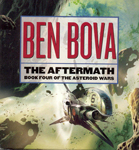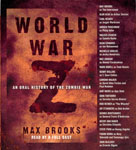
 His Majesty’s Dragon
His Majesty’s Dragon
By Naomi Novik; Read by David Thorn
5 CDs – 6.5 Hours [ABRIDGED]
Publisher: Random House Audio
Published: 2007
ISBN: 9780739354131
Themes: / Fantasy / Hard Fantasy / Alternate History / Dragons / 19th Century / War / Britain / France /
Aerial combat brings a thrilling new dimension to the Napoleonic Wars as valiant warriors rise to Britain’s defense by taking to the skies . . . not aboard aircraft but atop the mighty backs of fighting dragons.
Abridged! And here I thought we were beyond abridged audiobooks. I wasn’t even sure I’d ever see another abridged audiobook on a bookstore bookshelf again, let alone find myself listening to one. After all is said and done though, His Majesty’s Dragon wasn’t badly abridged, there were no jarring transitions, even if it felt as if large parts of the story were missing. Narrator David Thorn and his English accent gave Temeraire and the other dragons a kind of menacing innocence, full of a promise of danger and odd loyalty.
The world of His Majesty’s Dragon posits an alternate history where dragons, once the sole province of kings and emperors across Europe and Asia, are now a weapon delivery platform of choice for the military during the Napoleonic Wars. Will Laurence, a promising young sea Captain of the Royal Navy, captures a French ship carrying a precious bounty, an unhatched dragon egg. Unfortunately, what little the ship’s surgeon knows about dragon eggs is that this one will hatch soon. Too soon, in fact, for if the dragon within is to be of any use it must be harnessed immediately upon hatching to a sailor with whom it will have a lifelong bond.
Much of the action of the novel takes place in the training grounds of Britain’s “Aerial Corps.” The writing is professional and amicable, the characters are interesting and I get the sense this story will definitely appeal to the Harry Potter crowd, especially those who like a little romance in their fantasy. One of the standouts, character-wise, is a female dragon captain, who though battle hardened and physically scarred, packs an emotional wallop in the few scenes she graces. As this is the first book in a series it leaves a lot open at its conclusion, and perhaps my disappointment with the lack of integration within the larger pattern off history will be addressed by the subsequent books.
About that disappointment: History fans, like me, will probably be disappointed with the lack of historical detail. There’s good stuff, but not enough of it. Worse though, Novik’s world isn’t fully thought through. The changes she’s made to her historical setting don’t include any wide-ranging hard consequences. For instance, just having another sentient species on Earth would have had tremendous religious, societal and political ramifications to our history. But if individual members of that sentient species are as powerful as a Lancaster bomber you’d expect even more. These necessary changes are absent, or if not entirely omitted they are at least checkmated by dragons on opposing armies. Sure there attitudinal changes, mostly disdain, coming from the aspects of society that don’t interact with dragons on a daily basis, but this feels like the “muggle” solution, a cheat, like was done in the Harry Potter books. And that doesn’t fit the alternate history with one minor change vibe Novik was going for. Dragons, like the armor plated, jool-loving, fire-breathing creatures Novik uses, would have to impact culture from bow to stern. Just think how many cultures have mythical dragons in their history, now make them real! Simply put, there was work to be done and that work wasn’t done in His Majesty’s Dragon. Admittedly, the threads of the significant changes Novik has woven into her image are good. Attitudes toward women have changed within the Aerial Corps, and this is the most fascinating aspect of the book for me. But the dragon aspect of history feels as if they was just plopped atop an already existing rich tapestry of history, the threads attaching it to real history don’t go deep enough, and ultimately, this may be a case where the history and the fantasy are incompatible. But perhaps this is only an issue in the abridged version? If so I’d definitely be up for more in the Temeraire series – in which case I’d really need to get my mitts on the unabridged editions for subsequent books.
Posted by Jesse Willis





